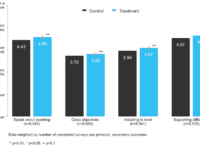„Gemeinsam Digital: Berlin“(Together Digital: Berlin) combines the digital and smart city strategies. We define smart as solving future challenges in creative, open, experimental and participatory ways. This strategy helps to establish new work approaches, agile methods, competence building, and a systematic knowledge transfer between the administration and its inhabitants. By aligning technologies, methods, and cultural processes, it supports existing strategies to reach their respective…
Innovation Tag: Experimentation
Together with partners from 5 other European countries, the Province of Fryslân developed an innovation model (so-called Tipping Approach) to catalyse and stimulate bottom-up innovations and harness ideas from local stakeholders. Complementing this, a governance model is being developed to provide civil servants with tools to implement these innovations in the social process in a simple and user-friendly way.
Providing school principals with simple rules of thumb improves school management practices and support to teachers in cost-effective and scalable ways. Evidence from an impact evaluation by the Ministry of Education in Guatemala and the Behavioural Insights Team showed that, an intervention inspired by the behavioural science literature, increased the frequency and quality of school management practices by principals and the satisfaction of teachers in Guatemala.
Nova Scotia has 21 Community Transportation Operators serving mainly vulnerable populations in rural areas. The CTOs were unable to feasibly procure a common dispatch and scheduling solution that met their needs, leaving them with inefficiencies and inability to meet growing needs. The Outpost for Public Sector Innovation designed a new approach to co-designing and procuring solutions to complex challenges. Together with stakeholders, partners and vendors, two viable solutions were developed.
Satellites collect images that can be used to identify deformations of infrastructure at millimetre level with InSAR analysis. This project investigates the use of InSAR in the monitoring of deformations of bridges. Can InSAR be of added value for a structural health assessment of bridges which, with aging assets over the largest part of Europe, becomes more and more critical? Nowadays the monitoring of bridges is very labour intensive and often not without danger. InSAR may reduce this.
Gov Buys Innovation is a modern version of public procurement, axed on the active search for innovative solutions available on the market. By reconsidering the way of interaction between the public and the private sector, we aspire to transform public entities into pioneers for new creative ideas, modernising countries in the benefit of private companies and all citizens.
The Evaluation Task Force (ETF) ensures evidence and evaluation sits at the heart of UK government spending decisions - any area routinely highlighted for improvement. ETF activity drives continuous improvements in the way programmes are evaluated to inform decisions on whether they should be continued, expanded, modified or stopped. It brings the same approach to the social sciences as medicine uses, fostering a culture of experimentation, learning and rigour.
Public sector agencies are generating more video/image data but much of the data is not leveraged due to the high overheads and custom requirements in processing video. The VAS platform provides easy access to a spectrum of in-house and industry developed video analytics capability as well as model prototyping capabilities for agency use cases. The key innovation focus on bringing together a scalable platform, lowering the barrier of entry for usage of video analytics, empowering the pub
Case Study
Turning Anticipatory Regulation from Principle to Practice: The Journey of the Regulatory Horizons…
Traditional ways of regulating are not able to keep pace with technological disruption, shifting sectoral boundaries, new types of problems and the opportunities innovation can bring. The Regulatory Horizons Council (RHC) is an independent expert committee set up the UK Government that identifies the implications of technological innovation, and provides government with impartial, expert advice on the regulatory reform required to support its rapid and safe introduction.
Discovery as a Service (DaaS) enables successful delivery of UK Policing Technology through standardised and outcome based discoveries to provide evidence and overcome inconsistency in project initiation. By employing user centric thinking, agile delivery, innovation, and multi-disciplinary teams, DaaS ensures new national technology initiatives provide beneficial capabilities to UK Law Enforcement so they safeguard the UK public. This service is the first of its kind in the Home Office.



